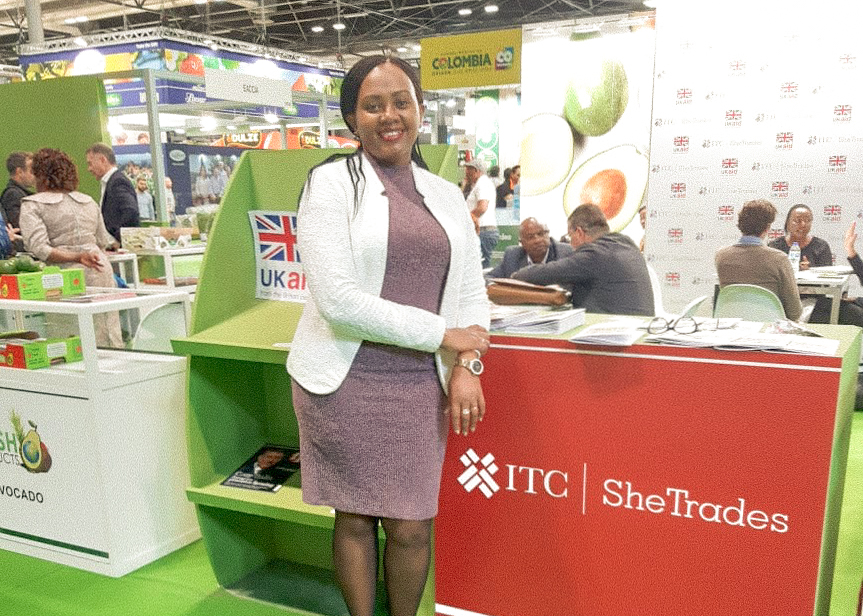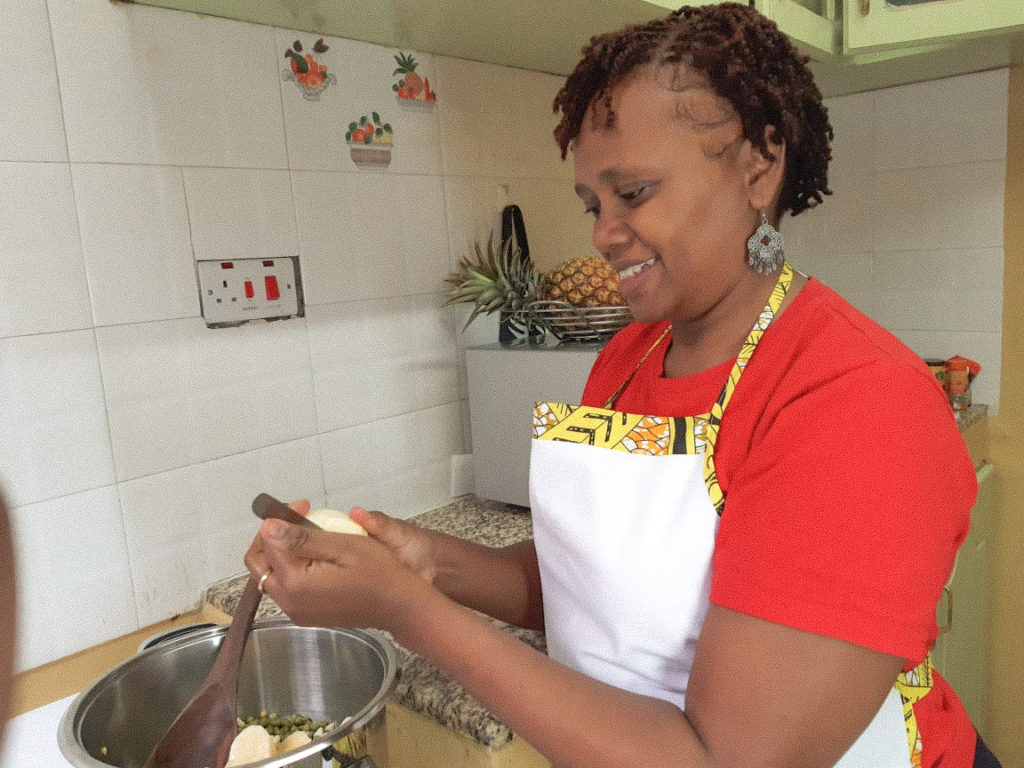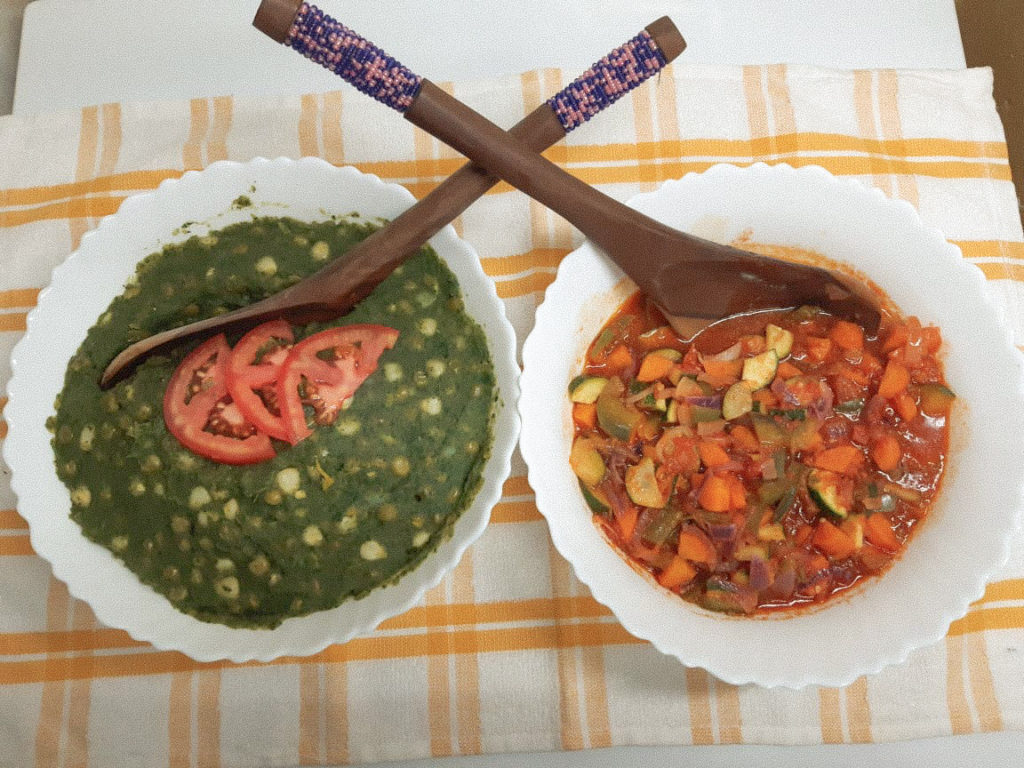A Seat at the Table
Susan Mugure Wambugu, Kenya

In Africa, 70% of the food produced was done so at the hands of a woman (World Economic Forum). Yet many of these women lack the same resources that their male counterparts have, including access to international trade. Susan Mugure Wambugu is on a mission to change that for the women in her home country of Kenya.
With over 22 years of experience in Africa’s agricultural industry and a seriously well-degreed background in horticulture, agribusiness, food safety, integrated pest management and more, Susan is using her knowledge and experience to help Kenyan women in agriculture advance. She works as an agriculture sector specialist with the SheTrades Commonwealth program which aims to increase economic growth and job creation in Commonwealth countries by increasing the participation of women-owned businesses in international trade. The project is funded by the UK Department for International Development and implemented International Trade Centre (ITC) under the framework of the SheTrades Initiative. To date, the program has empowered more than 300 Kenyan women-owned/led SMEs (small and medium sized enterprises) in the tea, coffee and fresh produce industries through access to international trade shows and training – including one-on-one business coaching provided in partnership by Global Women Fresh at the 2019 Fruit Logistica, Asia Fruit Logistica and Fruit Attraction shows.
We grabbed a ‘Seat at the Table’ with Susan to get her perspective on how to address the gender divide in Africa, and learn more about what motivates her to do the inspiring work she does. That’s not all Susan shared with us… she also gave us the recipe to her favorite veggie-inspired, Kenyan delicacies: mukimo & vegetable stew. Now that we know about them, we can’t wait to cook them up ourselves!
Q: What are the challenges facing women in agriculture in Kenya?
A: Women play significant roles in production and post-harvest processing; however, their participation has traditionally been in value chain nodes with lower economic value. These roles are often informal, unacknowledged, or under-resourced. In transportation, marketing, and sales, women are underrepresented outside local markets, playing limited roles that keep them from gaining in the most profitable portions of the value chain. Across the entirety of the value chain, women face limited access to information, hired labor, technology, assets, and networks. (IFC, 2016 – Investing in Women along Agribusiness Value Chains). When given equal access, women can make a significant contribution to the sector.
In my view, there are opportunities in the following areas (but not limited to):
- Investment in value addition/agro processing to extend shelf life and reduce postharvest losses
- Increased market demand for healthy food/super foods
- Investment in logistical technologies – storage, transportation, packaging
Q: What is an accomplishment you are most proud of?
A: The opportunities provided in my current role at SheTrades Commonwealth have given me the platform to influence and amplify the contribution of women in Kenya’s horticulture subsector.
Q: What is a professional or personal goal that you are focused on right now?
A: In my ambition to have an impact on zero hunger (SDG 2), I passionately advocate for reduction of postharvest losses as I believe this is the quickest win in the quest for food security. Even as research seeks to produce higher yielding cultivars, if we do not waste less and lose less of the harvested produce, it will take longer to achieve this goal.
It is also my aspiration to use my professional skills and expertise to expand the space for women in agriculture (SDG 5) to participate in the market place through capacity building, advocacy and contribute to policy making with regard to gender sensitive and gender smart interventions.
Specifically, I would like to mentor at least three young women into leadership/professional roles in agriculture.
Q: What is some advice that you would give your younger self?
A: Be more courageous and take the leap into bigger and more challenging roles and functions and have fun while at it.
Q: Who is a woman that you admire?
A: Professor Wangari Maathai – a renowned Kenyan social, environmental and political activist, the first African woman to win the Nobel Peace Prize (2004) and the founder of the Green Belt Movement. She passionately and actively advocated for environmental justice. Because of her unrelenting efforts, sometimes at the risk of her own personal danger, Nairobi today has green spaces, parks and forests which have been of great value in this COVID-19 season to relax and unwind in nature.
How is Susan unwinding these days? Spending time with her son and daughters walking in Karura Forest, (thanks to Prof. Wangari Maathai), and making and enjoying their favorite Kenyan meal: mukimo & vegetable medley stew. “My favorite recipe is mukimo, a Kenyan delicacy from central Kenya and liked by all. It is made from mashed potatoes, maize (corn) garden peas (or beans) and pumpkin leaves. I like mine with garden peas paired with a vegetable medley stew.”
Sounds amazing, right? Lucky for us, Susan shared her recipes below for both dishes.


Mukimo
Ingredients:
- Potatoes – peeled and cubed
- 1 cup green maize
- 1 cup garden peas
- A bunch of pumpkin leaves (chopped); spinach may be used as a substitute.
- Salt to taste
- Pre-boil the green maize and garden peas.
- When cooked add the potatoes and boil until soft.
- Drain the water and add pre-boiled pumpkin leaves (for a rich green colour, you can also puree the pumpkin leaves).
- Mix and mash the cooked ingredients until evenly smooth, ready to serve.
Vegetable Medley Stew
Ingredients:
- 1 medium zucchini/squash (cubed/cut in strips)
- 1 cup carrots (cubed/cut in strips)
- 1 bell pepper cut in strips
- 1 onion chopped
- 1 tomato pureed
- 1 cup vegetable stock
- Use a pan to fry the onions.
- Add the chopped vegetables and stir.
- Add the pureed tomato and stock; add salt to taste.
- Allow to simmer for five minutes, then enjoy!

